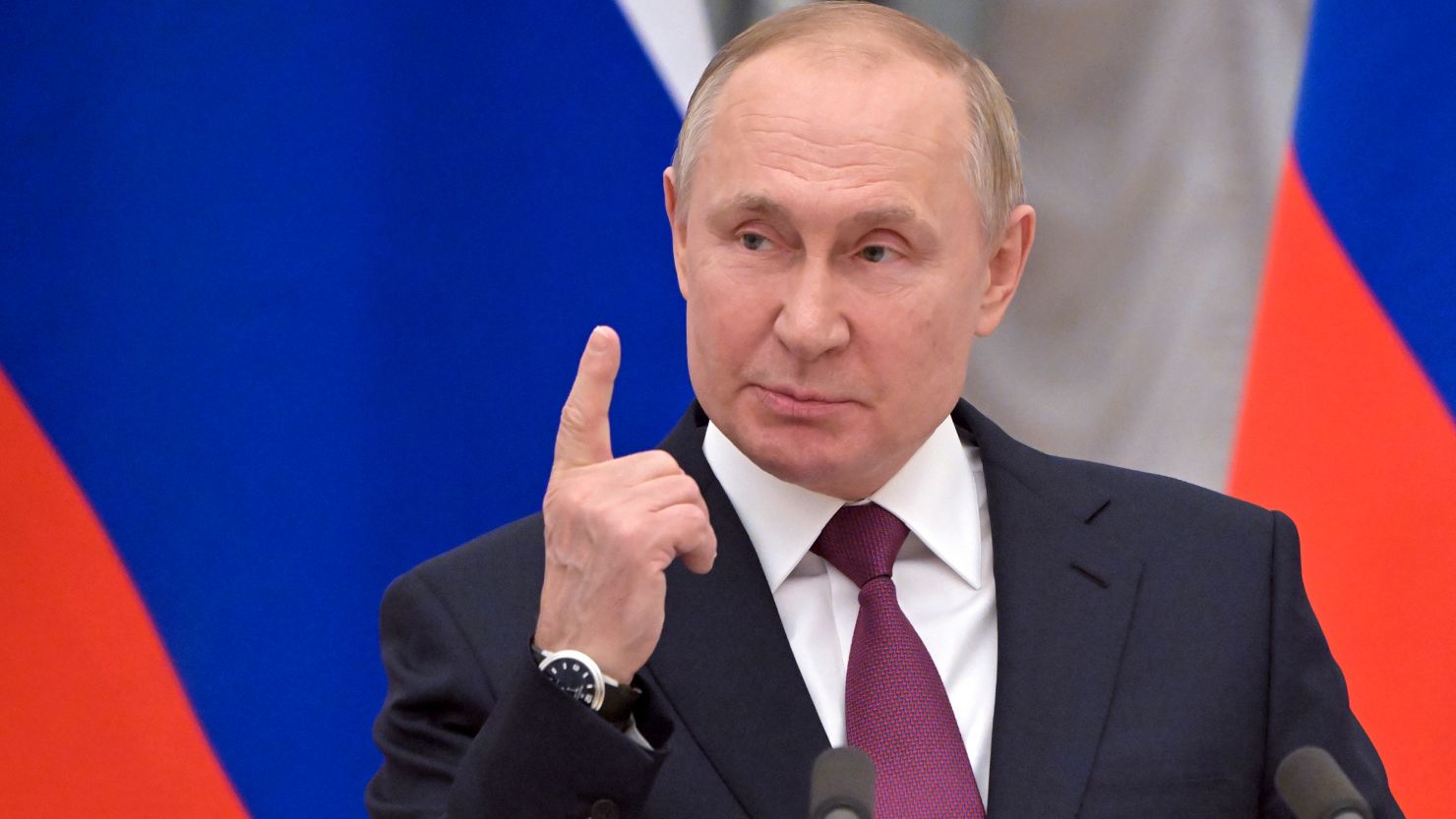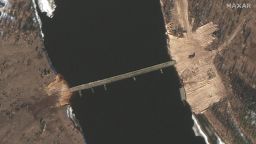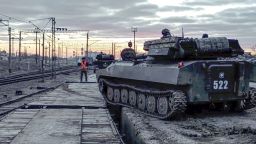Russian President Vladimir Putin is a man who likes to keep his options open, and the Ukraine crisis is no exception: As the Kremlin leader signals his willingness to engage on the diplomatic front, he is also bolstering a case for war.
Take the situation in Donbas, the territories in eastern Ukraine partly controlled by Russian-backed separatists. In a press conference with German Chancellor Olaf Scholz on Tuesday, Putin dropped the “g” word to describe the situation there.
“According to our estimates, what is happening in the Donbas today is genocide,” Putin said.
Scholz pushed back, later telling reporters that Putin was “wrong” to use the term. But those comments were already out in the public realm – and Putin had stepped up the rhetoric, much to NATO’s concern.
“There are many Russian intelligence officers operating in Ukraine,” NATO Secretary General Jens Stoltenberg said Thursday. “They are present in Donbas, and we have seen attempts to stage a pretext – false flag operations – to provide an excuse for invading Ukraine,” he added.
Russia denies that it has troops in Ukraine, and the closest Putin has come to publicly acknowledging the presence of his operatives in Donbas was back in 2015, when pressed on the matter by a Ukrainian journalist.
“We’ve never said there are no people there who deal with certain matters, including in the military area, but this does not mean that regular Russian troops are present there,” he said. “Feel the difference.”
Putin’s grievances in Donbas aren’t new. He has spoken repeatedly about what he describes as the violation of the rights of ethnic Russians and Russian speakers in Ukraine, and has stated that it is within Russia’s rights to intervene militarily to protect them.
But Putin appears to be making a case for his own version of a “responsibility to protect,” however distant the situation in Donbas may be from a Rwanda – where over 800,000 people, mostly Tutsis, were killed over the course of 100 days in 1994 – or Srebrenica – where more than 7,000 mostly Muslim men and boys were slaughtered in 1995.
Invoking genocide echoes Russia’s false claim that its neighbor, Georgia, committed genocide against civilians in the breakaway republic of South Ossetia in August 2008. During that brief conflict, Russia launched a massive military incursion that pushed deep into Georgian territory, a scenario that worries Western policymakers today when it comes to Ukraine.
The Investigative Committee, Russia’s top law enforcement body, took Putin’s comments a step further on Wednesday when it announced it had opened a criminal investigation into alleged evidence of what it called “indiscriminate shelling” of civilians in the Donbas region by Ukrainian forces since 2014.
In a press release laced with politically charged language, the Investigative Committee said it had opened a criminal case under Part 1 of Article 356 of the Criminal Code of the Russian Federation, which covers mistreatment of the civilian population and the use of means and methods prohibited by an international treaty in an armed conflict.
The statement by the Investigative Committee echoed Putin’s genocide talk, saying, “The intent to exterminate the inhabitants of Donbas is obvious – the Russian investigation recorded hundreds of such facts that qualify as evidence of the use of prohibited means and methods of warfare.”
It’s clear why the Kremlin wants to change the subject: Back in 2015, for instance, shelling blamed on Russian-backed Donbas separatists claimed the lives of at least 30 people in the southeastern Ukrainian city of Mariupol.
Since conflict in Donbas began in 2014, thousands of civilians have been killed and injured in the fighting, according to United Nations estimates. But announcing an investigation – not by an independent body, and at the height of a confrontation with Ukraine – appears to be a clearly political move, whatever the truth of the allegations.
The concern among many observers of the Donbas conflict is that any flare-up – a fresh outbreak of fighting, an exchange of artillery fire – could become a pretext for more drastic action by the Russian military. Those concerns were driven home Thursday, after both Ukrainian armed forces and separatists controlling parts of eastern Ukraine reported renewed shelling in the region early Thursday.
Video and images confirmed by CNN show that a pre-school in Ukrainian-controlled territory was hit by a shell Thursday. The school is three miles from what is known as the Line of Contact, which separates the two sides. CNN has not established who initiated the exchange of fire. Violations of a 2015 ceasefire agreement in the region occur regularly.
And then there’s also the nettlesome question of the legal status of the separatist regions of Donbas. Russia has never recognized the self-declared Donetsk People’s Republic (DPR) and the Luhansk People’s Republic (LPR), in Donbas, as sovereign and independent states, even as it has handed out Russian passports to people living there.
Russian lawmakers earlier this week appealed to the Russian President to recognize the breakaway republics in Donbas as independent. That, too, creates a potential situation where Russia might declare the need to respond to Ukrainian “aggression” against those statelets.
Would that happen? Recognition of the DNR and LNR would effectively scuttle the Minsk agreements, a package of measures that, for now, the Kremlin says is the only way to resolve the Ukraine crisis – and Kremlin spokesperson Dmitry Peskov made clear on Thursday that Putin remained cool to the proposal, emphasizing that the proposal by lawmakers was not a formal bill.
But manufacturing more problems can also benefit the Kremlin: It expands the menu of options at Putin’s disposal.





